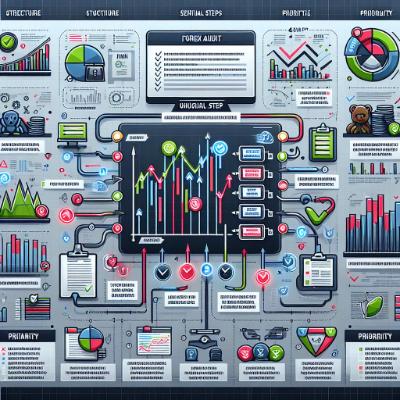What You Need to Know About Forex Trading Tips and Strategies

Are you interested in Forex trading? If so, you’ve come to the right place. Whether you’re a beginner or an experienced trader, having the right tips and strategies can make all the difference in your success.
Forex trading, also known as foreign exchange trading, is the buying and selling of currencies on the global market. It’s a fast-paced and exciting market that offers great potential for profit.
But before you dive in, it’s important to understand the basics and develop a solid trading plan. That’s where our Forex trading tips and strategies come in.
Our team of experts has years of experience in the Forex market and is here to help you navigate the complexities of trading. From understanding different currency pairs to analyzing market trends, we’ll provide you with the knowledge and tools you need to make informed trading decisions.
Whether you’re looking to trade full-time or just want to supplement your income, our tips and strategies will give you the edge you need to succeed in Forex trading.
So why wait? Start your Forex trading journey today and unlock the potential for financial freedom.
Understanding Forex Trading
Forex trading, also known as foreign exchange trading, is the buying and selling of currencies on the global market. It is the largest and most liquid financial market in the world, with trillions of dollars being traded daily.
Forex trading involves speculating on the price movements of currency pairs. Traders aim to profit from the fluctuations in exchange rates by buying a currency at a lower price and selling it at a higher price, or vice versa.
One of the key features of forex trading is leverage, which allows traders to control larger positions with a smaller amount of capital. This can amplify both profits and losses, so it is important for traders to manage their risk effectively.
Forex trading is conducted through a network of banks, financial institutions, and individual traders. It operates 24 hours a day, five days a week, as trading sessions open in different time zones around the world.
There are several factors that influence the forex market, including economic indicators, geopolitical events, and central bank policies. Traders need to stay informed about these factors and analyze them to make informed trading decisions.
Successful forex trading requires a combination of technical analysis, fundamental analysis, and risk management. Traders use various tools and strategies to analyze charts, identify trends, and predict future price movements.
It is important for traders to have a solid understanding of the forex market and its dynamics before getting started. They should also develop a trading plan and stick to it, while continuously learning and adapting to market conditions.
In conclusion, forex trading is a dynamic and potentially profitable market that offers opportunities for traders to profit from currency price movements. However, it is important to approach it with caution and to continuously educate oneself to stay ahead in this ever-changing market.
Key Concepts in Forex Trading
When it comes to forex trading, understanding key concepts is essential for success in the market. Here are some important concepts that every trader should be familiar with:
1. Currency Pairs: Forex trading involves the buying and selling of currency pairs. A currency pair consists of two currencies, with the first currency being the base currency and the second currency being the quote currency. Understanding how currency pairs work is crucial for analyzing and predicting market movements.
2. Exchange Rate: The exchange rate represents the value of one currency in relation to another. It determines how much of the quote currency is needed to purchase one unit of the base currency. Exchange rates fluctuate constantly due to various factors such as economic indicators, geopolitical events, and market sentiment.
3. Bid and Ask Price: In forex trading, there are two prices for each currency pair: the bid price and the ask price. The bid price is the price at which traders can sell the base currency, while the ask price is the price at which traders can buy the base currency. The difference between the bid and ask price is known as the spread.
4. Leverage: Leverage allows traders to control larger positions in the market with a smaller amount of capital. It is a double-edged sword, as it can amplify both profits and losses. Understanding how leverage works and managing it effectively is crucial for risk management in forex trading.
5. Technical Analysis: Technical analysis is a method of analyzing historical price data to identify patterns and trends. Traders use various tools and indicators to make predictions about future price movements. Understanding technical analysis can help traders make informed trading decisions.
6. Fundamental Analysis: Fundamental analysis involves analyzing economic, political, and social factors that can impact currency prices. Traders look at indicators such as GDP, inflation rates, interest rates, and geopolitical events to assess the strength or weakness of a currency. Understanding fundamental analysis is essential for long-term trading strategies.
7. Risk Management: Risk management is a crucial concept in forex trading. It involves strategies and techniques to minimize potential losses and protect capital. Traders use tools such as stop-loss orders and position sizing to manage risk effectively.
8. Market Sentiment: Market sentiment refers to the overall attitude of traders towards a particular currency pair or the market as a whole. It can be influenced by various factors such as economic data, news events, and investor sentiment. Understanding market sentiment can help traders gauge the direction of the market.
9. Liquidity: Liquidity refers to the ease with which a currency can be bought or sold without causing significant price movements. Major currency pairs are considered highly liquid, while exotic currency pairs may have lower liquidity. Understanding liquidity is important for executing trades at desired prices.
10. Trading Plan: A trading plan is a set of rules and guidelines that a trader follows to execute trades. It includes entry and exit strategies, risk management rules, and trading goals. Having a well-defined trading plan is essential for maintaining discipline and consistency in forex trading.
By understanding these key concepts in forex trading, traders can make informed decisions and develop effective trading strategies. It is important to continue learning and staying updated with market trends to stay ahead in the dynamic forex market.
Benefits of Forex Trading
Forex trading, also known as foreign exchange trading, offers numerous benefits for both experienced and novice traders. Here are some of the key advantages of engaging in forex trading:
- Liquidity: The forex market is the largest and most liquid financial market in the world, with trillions of dollars being traded daily. This high liquidity ensures that traders can easily enter and exit positions at any time, allowing for greater flexibility and control over their investments.
- 24/5 Market: Unlike other financial markets, such as the stock market, the forex market operates 24 hours a day, 5 days a week. This means that traders can participate in trading activities at any time, regardless of their geographical location or time zone.
- Global Accessibility: Forex trading is accessible to traders from all around the world. With the advancement of technology, traders can easily access the forex market through online trading platforms, enabling them to trade from the comfort of their own homes or on the go.
- High Potential for Profit: Due to the volatility of the forex market, there is a high potential for profit. Traders can take advantage of price fluctuations and leverage their positions to amplify their gains. However, it is important to note that trading in the forex market also carries a certain level of risk.
- Diversification: Forex trading allows traders to diversify their investment portfolio. By trading different currency pairs, traders can spread their risk and potentially reduce the impact of any single trade on their overall portfolio.
- Low Transaction Costs: The transaction costs associated with forex trading are relatively low compared to other financial markets. This is because the forex market operates on a decentralized network, eliminating the need for intermediaries and reducing trading fees.
Overall, forex trading offers a range of benefits, including high liquidity, accessibility, and the potential for profit. However, it is important for traders to educate themselves and develop a solid trading strategy to navigate the complexities of the forex market effectively.
Developing a Forex Trading Strategy
Developing a solid forex trading strategy is essential for success in the foreign exchange market. A well-thought-out strategy helps traders navigate the complexities of the forex market and make informed decisions.
1. Define Your Goals: Before developing a trading strategy, it’s important to define your goals. Are you looking to generate consistent income or make high-risk, high-reward trades? Understanding your objectives will help shape your strategy.
2. Analyze the Market: To develop an effective forex trading strategy, you need to analyze the market. Study currency pairs, economic indicators, and global events that impact the forex market. This analysis will help you identify trends and patterns that can inform your trading decisions.
3. Choose Your Trading Style: There are different trading styles in forex, including day trading, swing trading, and position trading. Each style requires a different approach and timeframe. Consider your personality, time availability, and risk tolerance when choosing your trading style.
4. Set Risk Management Rules: Risk management is crucial in forex trading. Determine how much capital you’re willing to risk on each trade and set stop-loss orders to limit potential losses. Stick to your risk management rules to protect your trading account.
5. Test and Refine: Once you’ve developed a trading strategy, it’s important to test it in a demo account or with small trades. Monitor the results and make adjustments as needed. Continuously refining your strategy based on real-time market conditions is key to long-term success.
6. Stay Disciplined: Emotions can cloud judgment and lead to impulsive trading decisions. To stay disciplined, follow your trading strategy and avoid making impulsive trades based on fear or greed. Stick to your plan and trust in your analysis.
7. Stay Informed: The forex market is constantly evolving, so it’s important to stay informed about market news, economic events, and geopolitical developments. Stay updated with relevant information that can impact your trading strategy.
By developing a forex trading strategy and following it consistently, you can increase your chances of success in the forex market. Remember, trading in the forex market involves risks, and it’s important to only trade with capital you can afford to lose.
Setting Clear Goals
Setting clear goals is an essential step in achieving success in forex trading. Without clear goals, it can be difficult to stay focused and make informed decisions. Here are some tips to help you set clear goals for your forex trading journey:
- Define your objectives: Start by clearly defining what you want to achieve through forex trading. Are you looking to generate a steady income, build long-term wealth, or simply gain experience in the financial markets? Understanding your objectives will help you create specific and measurable goals.
- Set realistic targets: It’s important to set goals that are realistic and achievable. While it’s great to aim high, setting unrealistic targets can lead to frustration and disappointment. Consider your trading experience, available time, and risk tolerance when setting your targets.
- Break it down: Break your overall trading goal into smaller, manageable milestones. This will make it easier to track your progress and stay motivated. For example, if your goal is to generate a certain amount of profit within a year, you can break it down into monthly or quarterly targets.
- Make it time-bound: Setting a timeline for your goals adds a sense of urgency and helps you stay disciplined. Determine specific deadlines for each milestone and hold yourself accountable to meet them.
- Write it down: Putting your goals in writing makes them more tangible and increases your commitment to achieving them. Create a trading plan that outlines your goals, strategies, and risk management techniques. Refer to it regularly and make adjustments as needed.
- Review and revise: Regularly review your goals and assess your progress. This will help you identify any areas that need improvement and make necessary adjustments to your trading plan. Stay flexible and be willing to adapt your goals as market conditions change.
By setting clear goals, you’ll have a roadmap to guide your forex trading journey. Remember to stay disciplined, stay focused, and never lose sight of your objectives. Good luck!
Analyzing Market Trends
When it comes to forex trading, analyzing market trends is crucial for making informed decisions. By understanding the direction in which the market is moving, traders can identify potential opportunities and minimize risks. Here are some key tips for analyzing market trends:
- Use technical analysis: Technical analysis involves studying historical price data and using various indicators to predict future price movements. This can include analyzing charts, patterns, and trends to identify potential entry and exit points.
- Follow economic indicators: Economic indicators, such as GDP, inflation rates, and interest rates, can have a significant impact on currency values. By keeping an eye on these indicators, traders can anticipate market movements and adjust their strategies accordingly.
- Monitor news and events: News and events, such as political developments, economic announcements, and natural disasters, can cause significant fluctuations in the forex market. Staying informed about current events can help traders anticipate market reactions and make timely decisions.
- Consider market sentiment: Market sentiment refers to the overall attitude of traders towards a particular currency pair. By gauging market sentiment, traders can determine whether the majority of traders are bullish or bearish, which can provide valuable insights into potential market movements.
- Utilize fundamental analysis: Fundamental analysis involves analyzing the underlying factors that influence currency values, such as economic policies, geopolitical events, and market trends. By understanding these factors, traders can make more informed decisions based on the long-term outlook of a currency pair.
Remember, analyzing market trends is an ongoing process that requires continuous monitoring and adaptation. By staying informed and utilizing various analytical tools, traders can improve their chances of success in the forex market.
Choosing the Right Indicators
When it comes to forex trading, choosing the right indicators is crucial for success. Indicators are tools that help traders analyze market trends and make informed trading decisions. With a wide range of indicators available, it can be overwhelming to determine which ones to use. Here are some tips to help you choose the right indicators for your trading strategy:
| Tip | Description |
|---|---|
| 1 | Understand Your Trading Strategy |
| 2 | Identify Your Trading Goals |
| 3 | Consider Your Trading Style |
| 4 | Research Different Indicators |
| 5 | Test Indicators in a Demo Account |
| 6 | Combine Indicators for Confirmation |
Understanding your trading strategy is essential before choosing indicators. Different strategies require different indicators, so it’s important to know what you’re looking to achieve. Identify your trading goals, whether it’s short-term profits or long-term investments, as this will also impact the choice of indicators.
Consider your trading style as well. Are you a trend follower or a contrarian trader? This will determine the type of indicators that suit your style. It’s also important to research different indicators and understand how they work. Some popular indicators include moving averages, relative strength index (RSI), and Bollinger Bands.
Once you have a list of potential indicators, it’s recommended to test them in a demo account. This allows you to see how the indicators perform in real-time market conditions without risking any actual money. It’s also a good idea to combine indicators for confirmation. Using multiple indicators can provide a more comprehensive analysis of the market and increase the accuracy of your trading signals.
Remember, choosing the right indicators is a personal decision and may require some trial and error. It’s important to find indicators that align with your trading strategy, goals, and style. By doing thorough research and testing, you can find the indicators that work best for you and improve your chances of success in forex trading.
Implementing Effective Forex Trading Tips
When it comes to forex trading, having a solid strategy is crucial for success. Here are some effective tips that can help you implement a successful forex trading strategy:
1. Set Clear Goals: Before you start trading, it’s important to set clear goals for yourself. Determine what you want to achieve in terms of profit, risk tolerance, and time commitment. Having clear goals will help you stay focused and make better trading decisions.
2. Develop a Trading Plan: A trading plan is a written document that outlines your trading strategy. It should include your entry and exit criteria, risk management rules, and trading goals. By following a trading plan, you can avoid impulsive decisions and stick to your strategy.
3. Use Stop Loss Orders: Stop loss orders are essential for managing risk in forex trading. A stop loss order is an instruction to close a trade at a certain price level to limit potential losses. By using stop loss orders, you can protect your capital and minimize the impact of losing trades.
4. Practice Risk Management: Risk management is crucial in forex trading. Never risk more than you can afford to lose and always use proper position sizing. It’s also important to diversify your trades and not put all your eggs in one basket. By managing your risk effectively, you can protect your capital and increase your chances of long-term success.
5. Keep Learning: Forex trading is a dynamic and ever-changing market. It’s important to continuously educate yourself and stay updated on market trends and news. Attend webinars, read books, and follow reputable forex blogs to expand your knowledge and improve your trading skills.
6. Embrace Discipline: Forex trading requires discipline and emotional control. Stick to your trading plan and avoid making impulsive decisions based on emotions. Keep your emotions in check and focus on following your strategy, even during periods of losses.
7. Analyze Your Trades: After each trade, take the time to analyze your performance. Identify what worked and what didn’t, and learn from your mistakes. By analyzing your trades, you can refine your strategy and improve your future trading decisions.
8. Stay Patient: Forex trading is not a get-rich-quick scheme. It requires patience and perseverance. Don’t expect to become a successful trader overnight. Stay committed to your strategy and be patient with the ups and downs of the market.
By implementing these effective forex trading tips, you can increase your chances of success in the forex market. Remember, forex trading is a skill that takes time and practice to master, so stay dedicated and never stop learning.
Q&A:
What is Forex trading?
Forex trading is the buying and selling of currencies on the foreign exchange market. It involves speculating on the price movements of different currency pairs and making profits from these fluctuations.
Is Forex trading risky?
Yes, Forex trading can be risky. The market is highly volatile and the prices of currencies can change rapidly. It requires a good understanding of market trends and analysis to make successful trades. It is important to manage risks and use proper risk management strategies to minimize losses.
What are some Forex trading tips for beginners?
Some Forex trading tips for beginners include: educating yourself about the market, starting with a demo account to practice trading, developing a trading plan, using proper risk management techniques, and staying disciplined and patient.
Are there any strategies that can help improve Forex trading?
Yes, there are various strategies that can help improve Forex trading. Some popular strategies include trend following, breakout trading, and range trading. It is important to choose a strategy that suits your trading style and to constantly analyze and adapt your approach based on market conditions.
Can I make a living from Forex trading?
While it is possible to make a living from Forex trading, it requires a lot of knowledge, experience, and dedication. It is not a guaranteed way to make money and there is always a risk of losing money. It is important to have realistic expectations and to be prepared to invest time and effort into learning and improving your trading skills.
What is Forex trading?
Forex trading, also known as foreign exchange trading, is the buying and selling of currencies on the foreign exchange market. Traders aim to profit from the fluctuations in exchange rates between different currencies.
Is Forex trading profitable?
Forex trading can be profitable, but it also carries a high level of risk. Success in Forex trading depends on various factors, including knowledge, experience, and market conditions. It is important to educate yourself and develop effective trading strategies to increase your chances of profitability.
What are some Forex trading tips for beginners?
Some Forex trading tips for beginners include: educating yourself about the market, starting with a demo account to practice trading, setting realistic goals, managing risk effectively, and staying disciplined. It is also beneficial to learn from experienced traders and stay updated on market news and trends.
What are some common Forex trading strategies?
There are various Forex trading strategies that traders use, including trend following, breakout trading, range trading, and scalping. Each strategy has its own set of rules and techniques. It is important to choose a strategy that aligns with your trading style and risk tolerance.
How much money do I need to start Forex trading?
The amount of money needed to start Forex trading varies depending on your trading goals and risk tolerance. Some brokers allow you to open an account with as little as $100, while others may require a larger minimum deposit. It is important to start with an amount you can afford to lose and gradually increase your investment as you gain experience and confidence.
What is Forex trading?
Forex trading is the buying and selling of currencies on the foreign exchange market. It involves speculating on the price movements of different currency pairs in order to make a profit.
What are some tips for successful Forex trading?
Some tips for successful Forex trading include developing a trading plan, using proper risk management techniques, staying disciplined and patient, and continuously learning and improving your trading skills.




